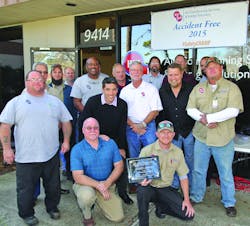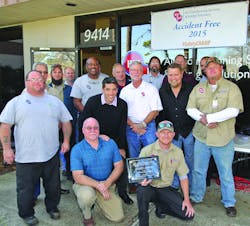Heating and air conditioning contractors will have differing standards of what makes a quality installation or service project. They may have different ideas about how to best recognize workers for their achievements. But the common conviction that all contractors must share equally, is the understanding that safety is the most vital ingredient at any company.
Human lives depend on the safety awareness of your employees as they drive to work each day, work at the job site, and perform various duties while at home.
Praised by AGC
In May, 2016, The Associated General Contractors of America’s Florida East Coast Chapter presented Hill York with a Safety Award of Excellence. The award is given to a select group of contractors who have made safety a core value and achieved exceptional results in risk avoidance and incident reduction.
“This award is a reflection of the commitment we’ve made to educating, training and rallying our employees around safety as the first priority in every situation,’ said Luis Moreno, who joined Hill York as safety director in 2014. “It’s why we started our #SafetyCHAMP program and how we get our team home safe on even the most demanding days.”
“All Hill Yorkers deserve a lot of credit for their hard work and vigilant attitudes in achieving this impressive safety record in 2015,” said CEO Robert “Chip” Lafferty. “The #SafetyCHAMP program’s results are evidence of a successful partnership with our customers and each other that keeps the focus right where it belongs – getting everyone home safe.”
Moreno is an OSHA 500-certified trainer and a specialist in fall protection. He says each Hill York office has its own safety committee, and each committee is very much guided by comments and suggestions from all employees.
An open-door policy that allows employees to speak up whenever they believe something can be done more safely.
“You must include employee feedback,” Moreno says. “Our program is not based on regulatory, although that is a factor. Our program is based on employee feedback. I don’t want to call it behavioral-based because it’s not. But it has a lot of aspects of a behavioral-based program.
Hearing from Employees
“A key element is making sure employees are heard and understood. Regulations will always mandate, of course. However, what surrounds regulations is employees’ feedback on how to work safely.”
From 2015 to 2016, a blog was posted on the Hill York website which covered a variety of safety topics, from the importance of proper workwear, to road rage, to the dangers of operating a cell phone while pumping gas. That blog has since been moved to an employee-only site, where they can still find regular safety
messages.
They have a daily morning briefing on a safety topic, including home issues that apply to personal lives, such as identity theft, or barbecuing safety.
Moreno says the #SafetyCHAMP program is supported by daily checklists, practices and procedures that help reduce risks and stop injuries before they happen. A daily 7 a.m. text message provides additional safety tips and cautions. Its popularity among employees has led some to even opt their spouses and children into getting the morning safety reminders by texting “HYSafe” to a special number.
“The best defense is always prevention,” Moreno says. “That means wearing protective equipment when activities warrant them, following safe practices in all situations with consistency and diligence, and making choices that favor risk avoidance over risk taking.”
The locations hold construction meetings and meetings with technicians to communicate safety topics, and provide formal training by an outside safety experts on a variety of work site topics, such as rigging. The experts who are brought in have plenty of book knowledge, but also practical work site experience.
Moreno does not believe online training can communicate safety practices. “I’m absolutely against online safety training, because it does not address specific hazards our employees are exposed to,” he affirms.
Moreno also believes accidents are caused by a variety of factors, and should not be blamed on the employee.
“I believe that if you really look at an accident, it might have to do with a person or procedures. But I believe it goes beyond the person. Was the person trained? Was he provided with the right type of ladder? Was the work area sufficient? It’s easy to point the finger at the employee. I look beyond that. Is it our policies and systems that are failing, that caused the situation?
Is safety just another bottom line expense? Absolutely not, Moreno says.
“It’s inexpensive, when you consider the results. If you have zero accidents, you don’t have that catastrophic accident that can cost the corporation millions. So, whatever you get out of a safety program will be based on how much you invest in it. You can’t put a price on a human life.”
About the Author
Terry McIver
Content Director - CB
As director of content for Contracting Business, he produces daily content and feature articles for CB's 38,000 print subscribers and many more Internet visitors. He has written hundreds, if not two or three, pieces of news, features and contractor profile articles for CB's audience of quality HVACR contractors. He can also be found covering HVACR industry events or visiting with manufacturers and contractors. He also has significant experience in trade show planning.

